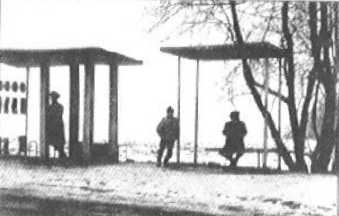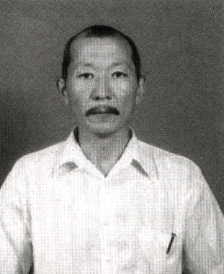

The directors shot the film in 1995 without any financial backing, and then abandoned the project for two years. Four strangers wait for a bus that never comes at a stop located close to a major, busy highway intersection. Shot exclusively in a stationary long-shot, the four—a boy, a man, a woman, and an elderly man who entertains them with his chiming watch—gradually emerge as a model of a nuclear family. They are joined at the stop by a drunk who throws the old man's watch into the snow, gets beaten up, and finally gets integrated into the family.
As with Samuel Beckett's Waiting for Godot, the spectator quickly realizes that the focus is not on the failure of the anticipated "other" to arrive, but on the nature of the bonds and interactions that characterize those waiting together.
Speaking at a press conference, Ernest Abdyzhaparov recalled: "Most of all we wanted to show our country in the film. Active life―a noisy thoroughfare that is intersected by a highway, while we just stand there and wait for something. … Obviously this is some sort of dead end because the bus doesn't come after all, and perhaps won't ever come. But the main thing is―the people who stand there. They are alive, human, and will always live together."

Aktan Abdykalykov was born in 1957 in the village of Kountouou, in the Sakoulou, region of Kyrgyzstan. Abdykalykov makes the following comments about his career: "In my work intuition helps me most of all. I did not have academic directorial training; I came to directing through practice, therefore it is necessary to depend on my innermost feeling." From 1976 until 1980 he studied at the Kyrgyz State School for the Arts. Beginning in 1980 he worked as the art director at Kygyzfilm Studios. In 1990 he made his debut as a filmmaker with the short documentary Le Chien qui court (1990). Abdykalykov has won substantial international recognition (for specific awards refer to the filmography below).

| 1990 | Le Chien qui court |
| 1992 | Where's Your Home, Snail? Jury's Prize at the International Film Festival at Ashgabat (Turkmenistan) |
| 1993 | La Balançoire (short) Grand Prize in the category of short films at The International Film Festival in Lokarno (Switzerland) |
| 1995 | Besh-terek (documentary) |
|
1996 |
Six public service commercials funded by the Soros Foundation |
| 1997 | Hassan-Hussen (short) Grand Prize at the International Festival of Film Shorts in Sienna (Italy) |
| 1998 | The Adopted Son (Beshkempir) The "Silver Leopard" at The International Film Festival in Lokarno (Switzerland); The "Don Quixote" prize at the International Association of Film Clubs; Grand Prize at the "Eurasia" International Film Festival in Almati (Kazakhstan) |
| 2001 | Assan-Oussen |
| 2000 | The Bus Stop Grand Prize at Kinoshok (Russia); 2nd place at The International Film Festival in Kottbus (Germany) |
| 2001 | Monkey (Maimyl) Honorable Mention at Cannes |

Ernest Abdyzhaparov was born in 1961 in Bishkek (Frunze, during the years of Soviet power), the capital of Kyrgyzstan. After working as schoolteacher, he began editing a film journal, Korogoch. In 1992 he began to work as a film editor at Kyrgyzfilm and to write film scripts with Aktan Abdykalykov. He is the general manager of "Asa-Musa," a film production company.
| 1993 | Menin Pirim Almambet (short) |
| 1995 | The Sparrow (short) |
| 1997 | Aldei (short) |
| 2000 | On the Threshold |
| 2000 | Bus Stop (short) |